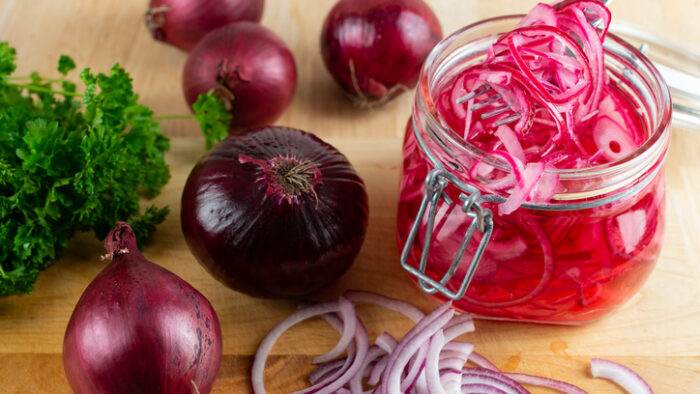Onions are an amazing substance. This underground bulbous extension of a plant stem is found around the world. It has been used both as a vegetable and as a spice.
Onion was considered non-vegetarian (aamish) food by some, a sort of animal product because it grew underground but was hot unlike most roots which are cooling; it was thus considered impure. It has a bad reputation for heating the body of a person that is trying not to be engaged in human desires, and can change our character and personality. Onions are grown all around the planet, from the Netherlands to Mexico to China and India, which produces about 13% of the world's export crop as well as huge amounts for domestic use.
Onions contain carbohydrate, protein, vitamins and minerals, such as copper, chromium, calcium, iron, magnesium, manganese, phosphorus, potassium, zinc, and flouride.

Since the Vedic times in ancient India known as Akhanda Bharata, the red onion (rakta palandu in Sanskrit) was described. We find at least 22 classic ancient texts that describe its properties in various ways, in over 320 references scattered through texts over thousands of years. From the Mahabharata and Garuda Purana to the Charaka Samhita and the Bhavaprakasha to the Kama Sutra, we see the description and popularity of red onions.
In the kitchen, onions are used in myriad ways, cut into various shapes, used raw and also cooked; they can be baked, boiled, sauteed and always add flavor to the food. But how does an item that is so benign that it can be used as a popular food also have medicinal properties?
Medicinally, the raw red onion is described for many uses by ancient Ayurvedic physicians.
To revive consciousness: The ancient medical texts advise that raw freshly-squeezed onion juice can be placed drop by drop into the opening of the nostril to revive consciousness.
Nose bleed: Ancient medical texts describe the use of raw freshly-squeezed juice from a few onions placed drop by drop into the bleeding nostril will stop the bleeding.
Ear pain: Ancient medical texts prescribe freshly-squeezed onion juice mixed with an equal amount of vinegar and of rosewater, warmed slightly with placement of just a few drops into the ear canal to reduce ear pain.
Belly ache: The ancient medical texts are replete with remedies for the gut. For reducing belly aches, ancient physicians recommended eating boiled onions with some salt-containing medicines such as lavana-bhaskar. This works because the extra heat that the onion and the salts and minerals provide in the cauldron of the belly induce digestive enzymes that increase their activity to process the undigested food.
Urinary burning: Ancient physicians encountered urinary tract infections, usually occurring in those with compromised immune systems or those who had gotten infected. If the opening burned during urination, the prescription was given to drink about 60 ml of boiled onion juice after freshly-squeezing the juice from fresh onions.
Urinary retention: When urine does not want to pass out naturally and the urge occurs but flow is hampered, the urine cannot completely empty from the bladder. For the acute or chronic retention of urine, ancient physicians prescribed eating a medicinal formulation made with boiled onions mixed with the ash alkali of barley, known as yava-ksara, which captures its mineral essence.

In the ancient text Astanga-hrdayam (Sū. chap 6, sloka 13-14), barley is described for its excellent medicinal properties in diseases of the urinary tract, disorders of fat metabolism, and phlegmy conditions such as runny nose, wet cough, and the persistent throat phlegm. Barley (yava) has the properties of being drying (ruksha), cooling and contracting (sheeta) and stabilizing (guru). In urinary bladder imbalances, consumption of barley dries up and cools the inflammation, and promotes contraction of the muscles to allow increased flow of urine out of the body. People with chronic urinary tract problems may increase barley in their diet.
Hemorrhoids: Ancient medical texts recommend drinking raw onion juice with rock sugar for the relief of bleeding piles.
Low sperm count: Ancient medical texts prescribed the preparation of onions mixed with a special arsenic-based preparation to raise the sperm count. Used commonly by specialist physicians known as rasa-vaidyas, the use of metals that are processed for use in severe or incurable diseases was known well by Ayurveda to revive and reorient tissues of the body, just as platinum or gold or arsenic have been discovered and used in chemotherapy today.
Burn wounds: Ancient physicians treated burn wounds and scars with the expressed juice of freshly-cut onions, applying the juice to semi-healed scars to repair the wounds. The juice would seep in and create some irritation, which called in the immune clean-up crew called macrophages in modern science, which function to allow new scaffolding of skin tissue.
Wasp bites and bee stings: Ancient medical texts advised rubbing freshly cut minced onion to skin burning from wasp and insect bites and bee stings, to reduce the burning. This is similar to the use of homeopathic Allium cepa for the burning sensations in the body, especially when weeping or flow of liquid from the tissues is present.
Menstrual aches: Ancient physicians prescribed eating sauteed onions in pure cow ghee to alleviate menstrual difficulties in flow and menstrual pain.

Ancient physicians were discerning and deeply keen observers. The ancient medical texts also advised when NOT to use onions.
- Never eat onions if there is hyper-acidity or acid reflux.
- Avoid onions if there is a chronic sour taste in the mouth or sour eructations (reflux).
- If a person is weak in strength, avoid eating onions, as they require strength to digest.
- If a person is experiencing a lot of wind in the gut, burping or passing of gas, or bloating, avoid onions.
- Never eat onions if diagnosed with gastritis, as onions further increase the stomach juice.
- In all vata aggravation conditions, it is recommended to avoid onions.
Onions have a mysterious usefulness, perhaps due to their complex chemical contents and energy. In the processing of metals to become useful to the human body in the form of bhasmas, onions are used in the grinding (bhaavana) of metals with organic plant compounds. Bhasmas (herbometallic and herbomineral ashes) of arsenic, godanti, haritala, and tamra (copper) are bhasma.
In addition, onions can detect compounds floating in the air. Placing a freshly cut onion near the bedside table before sleeping will absorb noxious chemicals that circulate while you sleep. In the morning, observe the onion by the bedside and compare it with the other half that was kept in another room, loosely covered. The bedroom onion will be shriveled if there are noxious compounds in the air.
Please consult with your Ayurvedic physician before engaging in home use of these remedies, as proportions and processes can make a difference between efficacy and adverse effect. Most modern medical doctors consider onions as superstitions and lacking in medical evidence, as they do with most non-pharmaceutical medicines.





